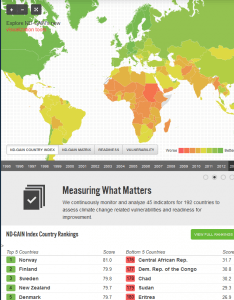The Central African Republic, Democratic Republic of Congo and Chad have been found to be least prepared for climate change. According to the University of Notre Dame Global Adaptation Index (ND-GAIN) which summarizes a country’s vulnerability to climate change and other global challenges in combination with its readiness to improve resilience, these three countries are ranked bottom out of a total of 180 countries. Other Central African countries are generally classified as least prepared to climate change. They include Cameroon, Congo, Equatorial Guinea, Burundi, and Gabon.
The University of Notre Dame Global Adaptation Index (ND-GAIN) helps businesses and the public sector better prioritize investments for a more efficient response to the immediate global challenges ahead.
Vulnerability:
According to the Adaptation Index, “Vulnerability measures a country’s exposure, sensitivity and ability to adapt to the negative impact of climate change. ND-GAIN measures the overall vulnerability by considering vulnerability in six life-supporting sectors – food, water, health, ecosystem service, human habitat and infrastructure.
Readiness
Readiness measures a country’s ability to leverage investments and convert them to adaptation actions. “ND-GAIN measures overall readiness by considering three components – economic readiness, governance readiness and social readiness.”
For details on Congo Basin countries, click on the interactive map below.
Click here to read the original article.

